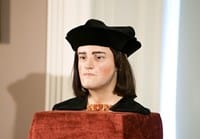The burial of a king is usually a significant event: full of pomp and pageantry, ritual and ceremony. And the same will be true when England buries its king in Leicester Cathedral in the coming months – despite the fact that the king in question, Richard III, died more than 500 years ago and that his first burial in what was then the church of the Greyfriars’ monastery was anything-but ceremonial.

Photo Credit: University of Leicester
History records Richard III as a child-killing despot; but his reputation as the killer of the “Princes in the Tower” has more to do with rumour, gossip and Shakespeare than any accurate historical account.
His two-year reign came during a turbulent period in English history. When Edward IV died in 1483, his 12-year-old son should have inherited the throne as Edward V. In view of the young king’s age, Richard was named Lord Protector. He moved the young king to the Tower of London, which was a royal palace as well as a prison, along with Edward V’s younger brother, also called Richard.
Click here to read the full story.




